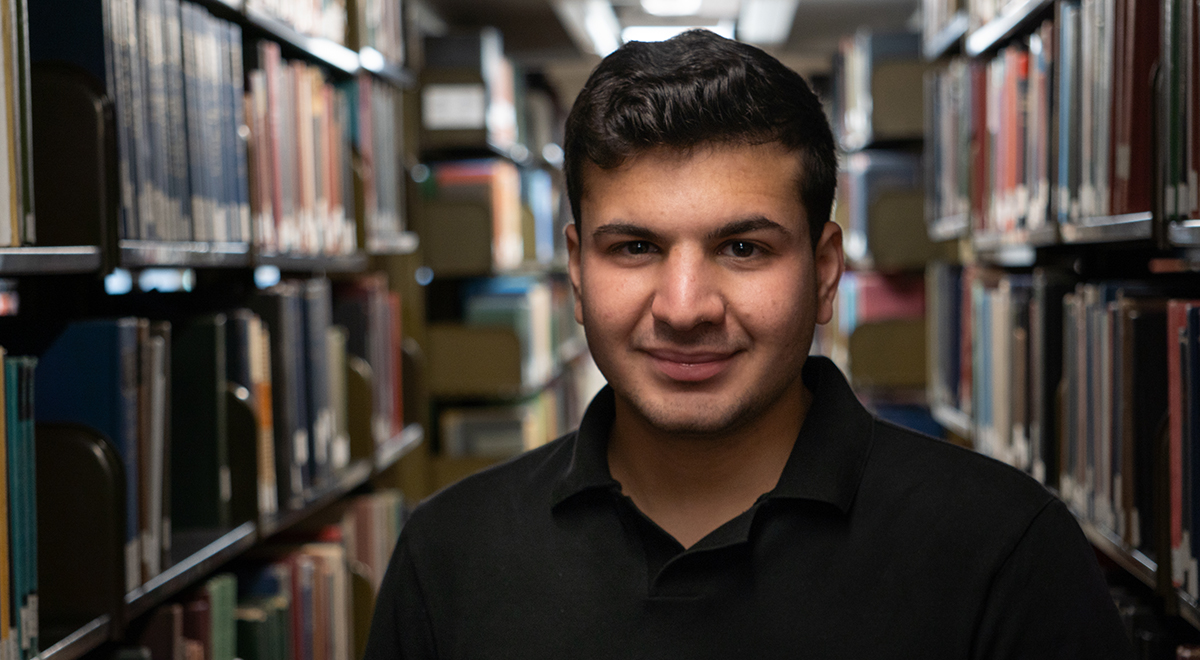Wesleyan Senior Studies Texas Book Challenges

To be clear: if you’re a parent worried about what your child is reading, Darin Iraj ’24 doesn’t have a problem with you taking their book away. “Every parent should have the ability to decide for their own child,” says Iraj, an education studies and government double major. “If you don’t want your kid to read a book, you’re losing out, but that’s fine.”
However, that’s not what the recent waves of book bans in American public schools are about. As Iraj presents in his thesis “School’s Not the Place for The Books: A Case Study of the Politics Behind & Pedagogical Impacts of Book Challenges in Four Texas K-12 Public School Districts,” small, zealous groups of community members—often with backing from conservative-leaning political action committees (PACs)—play outsized roles in pushing school districts to remove or disallow books that represent the experiences of marginalized groups. Meanwhile, these challenges have negatively affected many educators’ morale and teaching ability, contributing to a climate of fear in the classroom.
“What’s happening here is that they’re not just going to make the decision for their own students, they want to make the decision for every student,” Iraj says.
While book challenges—when an outside entity seeks the removal of a book from a public library or school—are nothing new in American history, they’ve swelled in volume since 2020. Last year, he says, American public schools received 3,362 book challenges targeting some 1,557 titles. These challenges are overwhelmingly aimed at titles related to underrepresented racial, ethnic, religious, gender, sexual orientation, ability, and linguistic groups. Iraj, who says diverse books are crucial for supporting the education of historically marginalized students, wanted to better understand the political dimensions of these initiatives as well as their impacts on pedagogy. “It just seemed like a very concerning issue that we weren’t paying enough attention,” Iraj says.
His research centered on four K-12 public school districts in Texas, a state at the forefront of the book challenge phenomenon. He interviewed teachers, carried out qualitative surveys with educators, watched dozens of hours of school board meetings—Iraj anonymized the names of the educators involved in his research, given the potential for harassment—and analyzed policy documents related to the challenges in these districts and the state legislature.
What emerges is a microcosm of a national movement that’s grown since the COVID-19 pandemic. Small groups of parents and community members—many of whom don’t have students in the district—challenge books via the school’s formal process, attend board meetings to advocate for policy changes, lobby legislators, and circulate book lists and templates to facilitate challenges. Politicians also sometimes pressure districts to remove books, introduce state legislation, and advocate for changes to local policy. They often use a range of pretexts for their targets. They claim books that include LGBTQIA+ content are sexually explicit or harmful and books that address race and history are Critical Race Theory, anti-white and anti-American. Further, these ostensibly grassroots groups frequently get financial support from PACs and other well-established organizations oriented around a Christian identity, parents’ rights, and various conservative causes.
“[Those groups’ involvement] raise concerns about the state of democratic ideals in decision making. For example, deliberation, non-repression … seemed violated, and after doing this work, I can confirm are being violated,” Iraj says.
In one district, Iraj says there had been just one vocal supporter of book challenges on the school board. The following election cycle, book challenge supporters took a majority of seats, backed by hundreds of thousands of dollars in spending from a company billing itself as a conservative-leaning phone and internet service provider. Once elected, the new majority set on changing structures and policies to ban books that, for instance, portrayed gender fluidity. “They did this all under a guise of protecting students from harmful content,” Iraj notes.
Along with spurring the removal of books from curricula—one district removed 67 titles, Iraj says—these initiatives have had chilling effects. Teachers, librarians, and administrators sometimes remove books preemptively. More broadly, some educators told Iraj they simply avoid wading into potentially sensitive subjects—even if students themselves want to talk about them—rather than risk losing their jobs or facing other penalties. “It really does limit the authentic conversation they can have,” Iraj says, “and that spills over into the relationships that teachers have with their students because they just feel so limited in what they can discuss.”
Moving forward, Iraj has designs on pursuing law and business degrees, and further exploring education policymaking. He hopes to restructure democratic institutions to make them more accessible and center the experiences and perspectives of marginalized individuals in their decision-making. “This [project] has definitely reinforced my interest in education policy in general,” he says.

